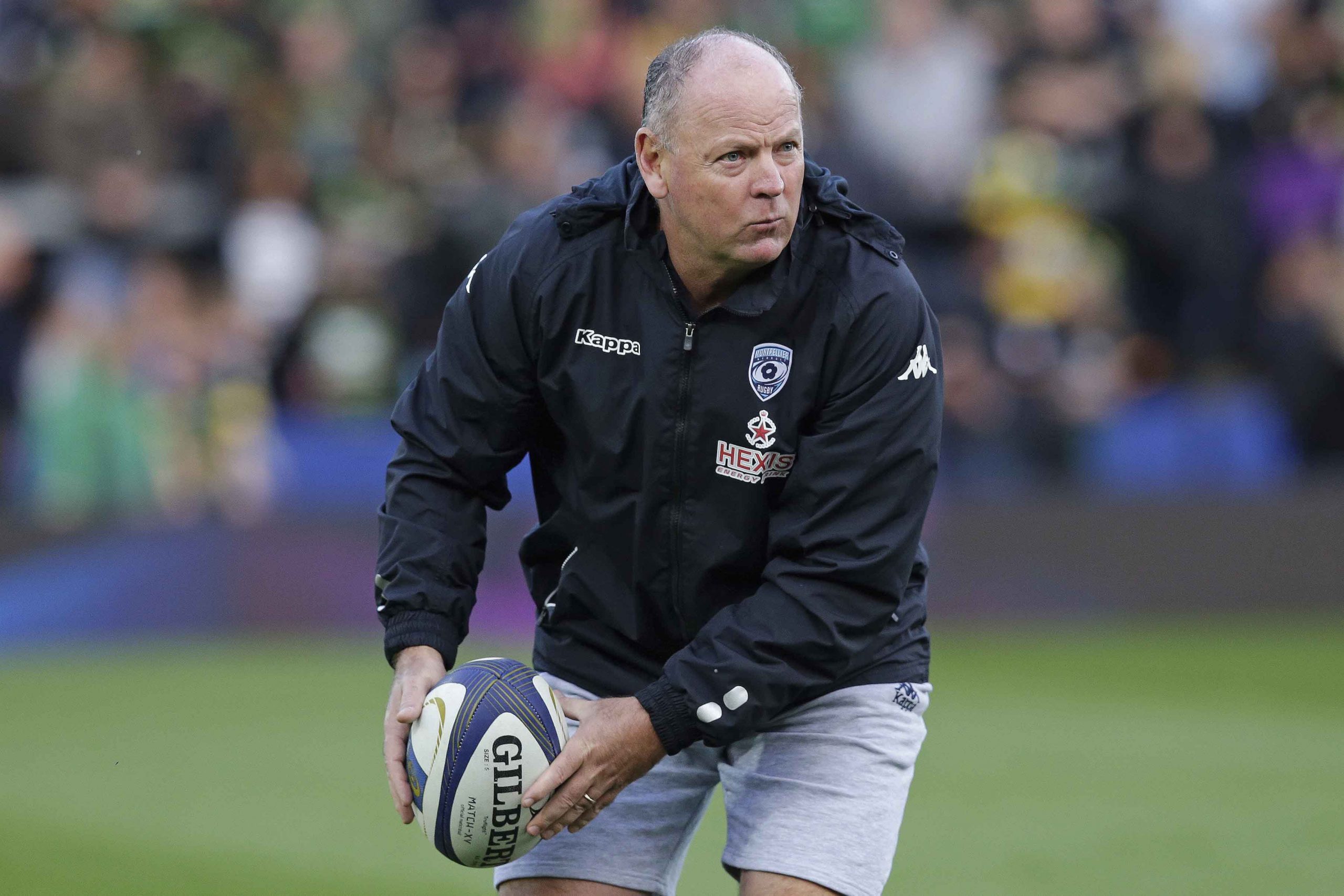Why is Jake White such a polarising figure?
The World Cup-winning coach has an impeccable CV, with an illustrious coaching career that has taken him all over the globe. But he has a reputation problem.
Author:
4 May 2020

For a man whose autobiography was pointedly titled In Black and White, Jake White’s coaching career has curiously played itself out mostly in grey areas.
Few people have divided opinion the way the new Bulls’ director of rugby has, from the time he first emerged as a young coach high on positivity and sold on his own big ideas about the game.
To briefly recap on his achievements since he hit South African rugby like an opinionated hurricane: White won the Under-21 version of the World Rugby Under-20 Championship. With the Springboks, he won the 2004 Tri-Nations, 2007 World Cup and was inducted into the World Rugby Hall of Fame in 2011. He went on to coach the Brumbies in Australia, guiding them to the 2013 Super Rugby final. The following year, and back in South Africa, he led a fair to middling Sharks team to the semifinal of the same competition. White went on to win the European Challenge Cup with Montpellier in 2016.
And if you’re in for those kinds of statistics, in selling 210 000 copies in South Africa, White’s autobiography actually outsold Harry Potter and the Deathly Hallows, by February 2008. Long story short, the 56-year-old has succeeded at most things he’s tried – including literature…
Yet when he was appointed director of rugby in March for a Bulls franchise that has lost its way since winning the Super Rugby title a decade ago, it was met with speculation on whether he was the right man for the job.
Polarising figure
Those who supported White’s appointment pointed to his proven ability to build struggling teams into competitive ones. Others, on the other hand, highlighted his penchant for leaving without finishing his contracts, ruining his relationships with bosses in the process.
Related article:
And when you consider what some of the players who have actually worked with White, James Dalton, Tendai Mtawarira, AJ Venter and some of the French players, have to say about him, it’s easy to come to the conclusion that he is a nasty piece of work.
Writing in his autobiography, Bulletproof – the James Dalton Story, Dalton panned White, describing him as a “spineless” coach who lacked innovation, relied on conditioning, discipline and physicality to win matches, and could only work with young players because he was a dictator. Tendai Mtawarira, in Beast, his memoir, accuses White of treating the Sharks like schoolboys and force-feeding them the Brumbies’ style of play.
AJ Venter, in a recent interview, said that White had “teacher’s pets” in his teams. Venter did not like White’s player management style. There was always a funny vibe between them, and he concluded that the coach did not “dig” him. One Montpellier player claimed that the only thing they improved under the South African’s tutelage was their English.
A stitch up job?
As ever with these things, the truth can be somewhere in the middle because I distinctly remember overhearing White asking a Durban colleague in the Loftus Versfeld press box to give Venter “a boost” in his match report before picking him for the first time for his Springbok team.
Be that as it may, whoever christened White “Jake the Snake”, a nickname the origins of which have never been fully expounded upon, made it permissible for South African rugby administrators, the media and public to do a hatchet job whenever his name came up.
An example of this was one of the Bulls’ communications people – probably alerted by White after he was asked to explain his fractious relationship with his rugby constituents – calling this reporter a few minutes after the interview with their new director of rugby to politely enquire whether the point of the story was to have another go at him.
Stitching White up without asking him for his side of the story has become something of a national pastime, which begs the question of why he thinks he’s so unpopular with the South African rugby public.
Related article:
“Sometimes perception plays a massive part,” he begins. “When I read some of the media sometimes I think: ‘Where did they get that from?’ The thing is coaches don’t have a forum where they can say ‘this is what happened’, whereas often a player will come out and talk to a journalist and that will be sold as gospel.
“I would never change anything I’ve ever done in my career, but I was coaching international rugby at 40 years old – some guys have just finished playing at that age – so I would have made mistakes and done things in a way other people wouldn’t.
“I suppose there would be people that read that stuff and would glean their feelings about me from what they read. But I’m sure some people are happy I’m back in South Africa, so I’ve got to take the good with the bad.”
Love and recognition
A former hooker who leads with the chin and is possessed with the abrasive personality inherent in most men who have played at the nub of the scrum, White has, for the longest time, come across as not having a compromising bone in his body.
Not only has that been read to mean he lacks empathy, it’s also led to conclusions he’s one of the few people on the planet who does not mind not being liked: “Everyone wants to be liked. I don’t think there’s anyone out there who doesn’t want to be liked.
“The two things people enjoy are love and recognition – those are probably two things that make people get up in the morning. I know that I’m not what I see in the papers.”
Surprisingly for someone who’s always given the impression of not caring much about what others think of him, White admits that it hurts to be seen the way he is. “Of course it hurts. I enjoy rugby and I know that when I put my head on the pillow and I go to sleep at night that I’m doing it for the right reasons and I’m not doing it to upset, fight or be unpopular with anybody.
“There are things that I look back at now and if you asked me if I’d do them the same way I would have said no. But I can genuinely tell you that when I went to bed that night I thought it was the best thing at the time.
“As I get older I wonder if I would have done the same things again. Maybe not, but let’s say this: maybe I would have but in another way because, having coached in other countries, I’ve found that there are other ways.”
White singled out his experience at Japanese club side Toyota Verblitz as having been instrumental in making him find other ways to get his message across due to the need for an economy and accuracy of words as communication is done through an interpreter.
“Being in Japan for three years taught me to know exactly what to say, how you say it and the manner in which to say it. You can’t shout and scream and perform with the Japanese because they are not a very emotive people.”
Collateral damage
That said, some of the collateral damage trailing in the wake of White’s growing pains as a coach has been great, if the state of his relationship with former Springbok captain John Smit is anything to go by.
Having won the World Cup together as coach and captain, the double act failed to conquer the world as coach and chief executive at the Sharks, which led to a once tight connection no longer being the same.
Related article:
“I have a massive respect for John as a captain and a Springbok,” White explains. “But I could see that relationship wouldn’t have lasted if I’d stayed on as coach and he was CEO. I didn’t think I was going to get continued success at the Sharks if I wasn’t going to be in a position where I could get the things in place we had agreed upon.
“Something had to give, he wasn’t going to leave his CEO position so I decided that it was better for me to move on. Rather I honoured it that way than stick it out and not achieve. But leaving the Sharks doesn’t mean that relationship is doomed.
“I really believe it was a decision I had to make for us to have respect for each other. Of course it’s a sad thing but I don’t believe there is any animosity or hatred between John and I. I’d like to believe as we get older it would be another learning experience in our lives together.”
A love affair with rugby
In the midst of all this intense focus on whatever White’s supposedly done wrong or is about to do wrong, there’s a tendency to forget that he’s a career coach madly in love with rugby.
Given his achievements in the game – and the view from his house in Hermanus from one of his recent interviews suggests he probably doesn’t need the money or the stress – White could retire and still be a hall-of-famer.
But he wants more: “I’ve been in rugby since I started playing when I was six at Dale College, and I’ve had rugby in my life every year since then. It’s been part of my life for so long that I can’t see myself having a year without being involved.
“I just love coaching to see how you build a team and, more importantly, how you change people’s lives. I’ve seen boys who were no-hopers and ended up playing first team rugby and getting bursaries into universities and now have wives and kids – I’ve enjoyed it since I was a teacher.
“As you get older you learn to handle the stress because you learn that it’ll always be there. For me it becomes less as you get older because you handle it differently. In the beginning you’re unaware where it’s coming from, now you know where it’s coming from and that it’ll always be there.
“But the stress is minor compared to the thrill you get during the good times.”
White may have taken a job in South Africa because he’s “a bit older and more reluctant to live miles away from everybody”, but the ambition to win things still burns hot, if his decision to choose the Bulls over the Southern Kings is anything to go by.
More of the same?
Whenever White takes over a new team there are three expectations: performance will improve, the playing style will be more workwear than smart casual, and he will leave before finishing his contract.
“Unfortunately or fortunately for me every team I’ve taken over has been at the bottom. If I could I would have liked to have taken over a team that was best in the world or their league and see if it’s easier, but as it’s turned out I’ve mostly taken teams that were at the bottom.
“But when you look at people try to emulate Alex Ferguson I wonder if that’s not more stressful. It’s a very difficult ask. The recipe to improving teams is going back to the things that are important and the things that are simple.
“When teams struggle it’s because they’ve neglected to do the things that are taken for granted. Players need to have buy in and clarity of roles.”
On the question of his pragmatic playing style, White’s answer is simply that “certain things in rugby will always be the same”, but he bristles at the idea he doesn’t honour his contracts.
Related article:
While he doesn’t explain what ended up being an unhappy stay at Montpellier, where the chairperson, players and fans seemed to turn against him, he has a logical explanation for not staying on at the Brumbies.
White didn’t understand being a South African who was allowed to coach a Brumbies team with “15 Wallabies” but not eligible to coach the Wallabies proper, so he says he took that as his cue to exit stage left.
Now that he’s back in South Africa, White is the most experienced, if not decorated, coach in an environment in which it has become the norm for conditioning coaches and players fresh from hanging up their boots to land the top jobs.
“We need to look at ways in which we can keep coaches in South Africa,” he says. “If you look at how much IP is abroad … Last year I got a WhatsApp from [SA Rugby director of rugby] Rassie [Erasmus] saying, ‘We need guys like you back in South Africa.’
“So we have to find a way to keep coaches in the country – too many are coaching overseas. Super Rugby is one step below Test rugby and we like to think that the Currie Cup is as important to us. We need to give the players in South Africa the best coaching we can.”
But first, there’s that tough crowd to win over again.




